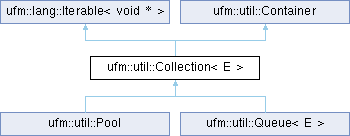 |
mFrame
|
 |
mFrame
|
集合介面,定義集合層次結構的根介面。 更多...
#include <Collection.h>

額外的繼承成員 | |
 公開方法(Public Methods) 繼承自 ufm::lang::Iterable< E > 公開方法(Public Methods) 繼承自 ufm::lang::Iterable< E > | |
| virtual void | forEach (ufm::func::Consumer< E & > &action) override |
| 遍歷集合中所有元素,對每個元素執行指定操作。 若所有元素處理完畢或操作中發生異常則停止。 | |
| virtual E * | elementAt (int index) const override |
| 獲取集合中指定索引處的元素。 | |
| virtual int | nextIndex (int index) const override |
| 返回當前索引的下一個有效索引。 | |
| virtual ufm::util::Iterator< E > | begin (void) override |
| 返回一個迭代器,用於遍歷集合中的元素 | |
| virtual ufm::util::Iterator< E > | end (void) override |
| 返回一個迭代器,用於遍歷集合的結尾 | |
 公開方法(Public Methods) 繼承自 ufm::util::Container 公開方法(Public Methods) 繼承自 ufm::util::Container | |
| virtual void | clear (void) override |
| 從此集合中刪除所有元素(可選操作) | |
| virtual bool | isEmpty (void) const override |
| 檢查此集合是否不包含任何元素 | |
| virtual int | size (void) const override |
| 返回此集合中的元素數量 | |
集合介面,定義集合層次結構的根介面。
| E | 此集合中保存的元素類型,預設為 void* |
Collection 是集合系統的基礎介面,定義了所有集合類型的共通操作。 集合表示一組物件(稱為元素),提供了元素的儲存、存取和遍歷功能。 不同的集合實作可能允許或不允許重複元素,可能是有序或無序的。